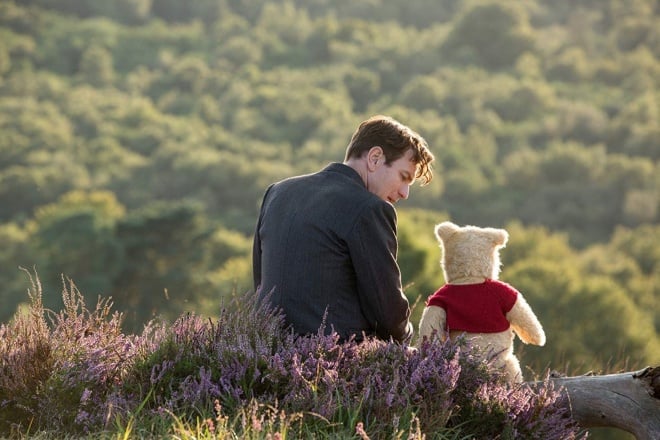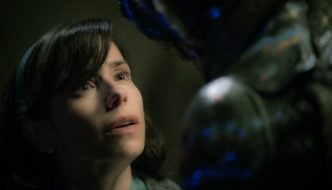
Credit: New Park Cinema
German director Marc Forster’s Christopher Robin imagines the tale beyond Winnie-the-Pooh. It centres on the titular Robin (Ewan McGregor), now an adult – a man hardened by the traumas of the second world war, the pressures of work, and the archetypal male patriarchy. A man who is torn between his duty to his work and spending time with his wife and daughter.
The film’s intention is clear: to communicate the lesson that it’s important to not plan ahead too much and become a slave to your job – and to always remember the value of family and love. The embedded Pooh-Bear stories are intended to facilitate this message; Christopher Robin’s memories of the child he once was, and the imagination he once had, hold the power to diffuse the seriousness of his adult life.
But there’s always a danger in taking the concept from an original story – especially one so well-known and loved – and here it doesn’t quite work. By continuing the story of a boy fixed in childhood, inevitably you take away one of the magical elements of the original. The beauty about Winnie-the-Pooh, as with any form of literature, is that the tale never ends. The nature of a book allows for it to be read, and re-read, and read again by someone new – to live on. However, what Forster’s film did was give the tale an unnecessarily premature ending.
It was, moreover, difficult to overlook the narrative inconsistencies: Christopher Robin was never a real person, but simply a fictional interpretation on Milne’s own son who, in actual fact, suffered tremendously from the consequences of his father’s publications. Historically recorded, and explored in Simon Curtis’ Goodbye Christopher Robin (2017), Milne based the fictional character ‘Christopher Robin’ from the Pooh-Bear stories on his own son. Moreover, he somewhat stole the idea of Christopher Robin playing with his teddy ‘Winnie-the-Pooh’ from his son’s own imagination. An innocent child’s play that became a global franchise. With his identity stolen, the real ‘Christopher Robin’ – formally known as Billy – became swept up in this whirlwind that his father had constructed. A life predetermined that he could not nor wanted to fulfil. With this bibliographical knowledge in mind, the idealised ending of Forster’s adaptation, then, becomes quite uncomfortable to watch. Also unconvincing was the attempt to adopt Milne’s tone in the additional lines, serving instead as a reminder that this was not the work of the original writer.
The continuation of the narrative framing “In Which” does fit with the story and maintain the simple form of its original. And aesthetically, it’s hard to fault the authenticity of the mise-en-scene, with the neutral colour pallet lending itself perfectly to the idyllic British countryside of the film’s setting. Each shot is so carefully composed it could be a painting – such as a few memorable moments where both young and old Christopher Robin are sat on a fallen tree branch in the field, passing some of Milne’s enriching lines between them. A classical British tale – if you can overlook the Americanisation of Pooh, Tigger, and Eeyore…
Perhaps, Forster’s adaptation wouldn’t have felt so unsatisfactory if Curtis’ Goodbye Christopher Robin hadn’t torn a part our hearts just one year prior. It is difficult to even try to draw any kind of comparison when Curtis’ film felt so real and raw, while this one just seems a bit fluffy.
Filed under: Film, TV & Tech
Tagged with: A.A. Milne, adaptation, Book Adaptation, christopher robin, Ewan McGregor, film, London, New Park



Comments